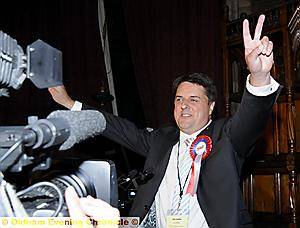BNP gains first Euro foothold
Reporter: Marina Berry
Date published: 08 June 2009
Griffin picks up 5,435 Oldham votes
‘Sad day for politics’ — rivals
The British National Party has won its first two seats in the European Parliament.
The far-right party's leader Nick Griffin gained a seat in the North-West after winning 8 per cent of the vote in the European elections.
And Andrew Brons won a seat in the Yorkshire and Humber region, where Labour lost a seat.
Mr Griffin sported a victory sign as he took his place alongside seven other newly elected Euro-MPs, including Greenfield’s Chris Davies
Mr Griffin strode on to the platform after the early morning declarations were made today at Manchester Town Hall, but when it was his turn to speak, the North-West’s seven other Euro-MPs marched off the stage and left the room, refusing to listen to his victory speech.
Anti-BNP protesters had earlier prevented Mr Griffin entering the town hall, where prospective Euro-MPs and their supporters gathered to hear the results, and police had to escort him into the premises.
He was involved in a round of press interviews as results from the 39 local authority areas came in and it was apparent he was in with a chance of becoming the BNP’s first Euro-MP.
Manchester was the first to be declared at 9.42pm, and the last came in at 1.15am, with Oldham’s result arriving third to the last at 12.50am.
There followed a period of anticipation before returning officer Howard Bernstein gave the final result in a close-fought election which saw the Conservatives walk away with three seats, given to Robert Atkins, Sajjad Karim — who was elected as a Liberal Democrat in the 2004 election but switched to the Tories part way through his term, and Jacqueline Foster.
Labour seats went to Arlene McCarthy and Brian Simpson, Chris Davies took the Lib Dem’s only seat, and Paul Nuttall UKIP’s only seat.
A total of 5,435 Oldham voters helped put Nick Griffin in the eighth seat, and were among 132,094 people in the North-West who voted for the BNP.
A total of 1,651,825 votes were cast, with the most going to the Tories — 423,174, followed by Labour with 336,831, the Lib Dems with 235,639 and UKIP with 261,740.
A huge shift from support for Labour in the wake of the expenses scandal — the party earned more than 576,000 votes in the last Euro-election, was blamed for the BNP gaining a seat, and Tory Robert Atkins said: “Sadly Labour’s fall has resulted in an aberration which many right-thinking people in the country and this region will be appalled by.”
BNP supporters shouted: “It’s called democracy,” but Mr Atkins’ views were echoed by the other parties with seats, with Arlene McCarthy launching into a tirade against the far right party, saying Labour would not work with it.
She said: “This was an angry election. People wanted to punish the mainstream parties and it will go down in history — the BNP is a party of prejudice and intolerance.”
Chris Davies, who has already served 10 years as a Euro-MP, said the victory for the BNP still meant 92 per cent of people in the North-West had rejected what was “a racist party,” and said: “We will work to make sure justice, liberty and tolerance are upheld.”
Mr Griffin insisted, however: “It’s a great victory, we go on from here,” and said he was only there because of the support of North-West voters.
He said: “The rest have all been caught with their snouts in the trough and we are here as a result.
“The country is a bankrupt slum. We have 30 years to turn things around and save this country.”
Oldham had a 30 per cent turnout, with a total of 47,060 votes.
Labour earned the biggest number, with 9,849, closely followed by the Conservatives with 9,182 and the Lib Dems with 8,778 and UKIP was fourth on the list with 7,402 votes.
Apathy sees the right gain strength
Voter apathy swept the Euro–elections with a surge of support for the right in some EU countries in the midst of a record low turnout.
Only 43 per cent bothered to go to the polls, according to official European Parliament figures.
And where voters did bother, the signs were they were voting on national issues, using the poll to pass judgment on national leaders and policies.
German Chancellor Angela Merkel boosted her centre–right fortunes ahead of a German national election in September, and President Nicolas Sarkozy of France saw off the Socialists to reinforce his political standing.
The biggest far–right showing was in the Netherlands, where the Freedom Party returned four MEPs, while the Austrian and Hungarian far–right factions were also doing well.
Most Viewed News Stories
- 1‘New’ town hall due to open to public for first time after full cost of major refurb project...
- 2Police issue appeal after woman dies after being found unconscious on road on Oldham/Tameside
- 3Former pub ‘left to rot’ for years is finally demolished
- 4‘Overpaid’ councillors speak out after payment error
- 5Saddleworth Rangers Girls enjoy dream day out at the iconic Wembley Stadium





